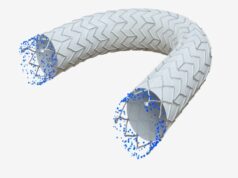Results from the multicentre, randomised, controlled PACIFIER trial were presented on 16 May at EuroPCR 2012. The one-year results demonstrated a statistically significant advantage for the IN.PACT Pacific drug-eluting balloon in preventing the superficial femoral artery (SFA) from renarrowing versus conventional, uncoated balloons.
The PACIFIER (Paclitaxel-coated balloons in femoral indication to defeat restenosis) study enrolled 91 patients across three hospitals in Germany. The one-year results demonstrated a statistically significant advantage in preventing the superficial femoral artery (SFA) from renarrowing when using the IN.PACT Pacific drug-eluting balloon (Medtronic) versus conventional, uncoated balloons.
On the primary endpoint results of LLL at six months, there was a statistically significant difference (p = 0.0014) and exceedingly low rate (-0.01mm) of LLL associated with the use of IN.PACT Pacific drug-eluting balloon compared to patients treated with an uncoated balloon (0.65mm). PACIFIER also significantly favored the IN.PACT Pacific drug-eluting balloon on a composite of death, amputation, and the need for target lesion revascularisation at one year (7.1% versus 34.9%, p=0.002).
“While preliminary drug-eluting balloon data from uncontrolled trials have been promising, the interventional community has eagerly awaited the results from a randomised trial to validate the clinical benefit of Medtronic’s IN.PACT drug-eluting balloons,” commented Michael Werk, assistant medical director, Department of Radiology, Martin Luther Hospital, Berlin, Germany and principal investigator and presenter of the PACIFIER trial. “Earlier research has hypothesised that drug-eluting balloons can reduce late lumen loss, restenosis rates and the need for repeat target lesion revascularisation, and now the one-year results of PACIFIER show, in a randomised forum, to what extent these results are possible.”
The company announced that the global IN.PACT clinical programme will include 24 studies involving approximately 4,000 patients and 200 sites across more than 80 countries worldwide. Through these company-sponsored and physician-initiated studies, the IN.PACT drug-eluting balloons will be investigated thoroughly for the treatment of arterial disease in coronary and peripheral vessel beds.
Last month, for example, Medtronic announced the start of the IN.PACT Global SFA clinical study, an international research programme to evaluate the treatment of peripheral artery disease using the company’s IN.PACT Admiral drug-eluting balloon in up to 1,500 “real world” patients. The first patient in the study is expected to be enrolled by the end of May.










